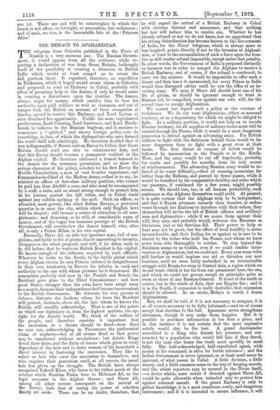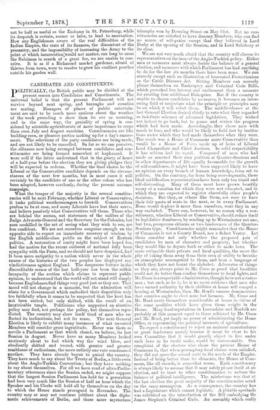THE MENACE TO AFGHANISTAN.
THE telegram from Calcutta published in the Times of Monday is a very ominous one. The Russian Govern- ment, it would appear from all the evidence, while ex- pecting a declaration of war from Great Britain, bethought itself of the possibility of creating a diversion in British India which would at least compel us to retain the full garrison there. It organised, therefore, an expedition in Turkestan, which it hoped would create alarm in Calcutta, and proposed to send an Embassy to Cabul, probably with offers of pecuniary help to the Ameer, if only he would assist in creating a disturbance upon the frontier. The Ameer, always eager for money, which enables him to base his authority upon paid soldiers as well as clansmen, and out of temper with the British on account of their occupation of Quetta, agreed to receive this Embassy, and Lord Lytton at once discerned his opportunity. -Unlike his more experienced predecessors, Lord Canning, Lord Lawrence, and Lord North- brook, he believes in the Russian bugbear, and is anxious to commence a " spirited " and showy foreign policy,—to do something, in fact, of which the diplomatists who once formed his world shall talk admiringly. He therefore decided that it was indispensable, if Russia sent an Envoy to Cabul, that Great Britain should send one also to countermine him, and that this Envoy should become a permanent resident in the Afghan capital. He therefore addressed a formal demand to the Ameer for the necessary permission, and to show the serious character of his policy, selected for his first Envoy Sir Neville Chamberlain, a man of vast frontier experience, and Commander-in-Chief of the Madras Army,—that is to say, he selected an officer of first-class military position, who cannot be paid less than £8,000 a year, and who must be accompanied by a staff, a suite, and an escort strong enough to protect him in his journey against the hill tribes, and in Cabul itself against any sudden uprising of the mob. Such an officer, so attended, must govern, like other Indian Envoys, a protected quartier in or near the city, within which only English laws will be obeyed ; will become a centre of attraction to all com- plainants; and disposing, as he will, of considerable sums of money, and of the vague but immense prestige of the British Government, will overshadow the Ameer himself, who, after all, is only a Prince Milan, in his own capital.
Naturally, Shere Au, an able but ignorant man, full of sus- picions, and liable to fits of gloom almost amounting to insanity, disapproves the whole proposal, and will, if he dares, reply as he did before, that he wants no British Resident in his capital. Be knows enough of the influence acquired by such officials. Wherever he looks to the South, to the fertile plains which every Afghan covets, he sees Princes reduced to insignificance in their own territories, by Envoys far inferior in rank and authority to the one with whose presence he is threatened. He remembers perfectly well how in the Punjab and Scinde the Resident gave place to the Chief Commissioner ; and how great States, stronger than his own, have been swept away in a month, because their independence had become inconvenient to the British Government. He distrusts his own powers of defence, distrusts the factions whom he fears the Resident will protect, distrusts, above all, the heir whom he knows the British will steadily acknowledge. That is one of the points on which our diplomacy is, from the highest motives, too up- right for the Asiatic world. We think of the welfare of the people, and therefore consider it important that the succession to a throne should be fixed—how fixed we care not, acknowledging in Travancore the preferential claim of nephews—but at all events fixed so that power may be transferred without revolutions; but Asiatic Kings dread their heirs, and the fixity of tenure which gives to every dependant of the heir and to every woman of his household a direct interest in hastening the succession. They like to select an heir who owes the succession to themselves, and who requires their protection until, at all events, the usual heir has given up the struggle. The British have always recognised Yakoob Khan, who bears to his father much of the relation which Ibrahim Pasha bore to Mehemet Ali, as the legal successor to the Afghan throne ; and Shere Ali, among all other terrors consequent on the arrival of the Envoy, feels that of seeing his power of selection finally set aside. There can be no doubt, therefore, that he will regard the arrival of a British Embassy in Cebu/ with extreme distrust and annoyance, and that nothing but fear will induce him to receive one. Whether he has already refused or not we do not know, but we apprehend that his strong disinclination has become known to the Government of India, for the Times' telegram, which is always more or less inspired, points directly if not to the invasion of Afghani- stan, at least to the accumulation of such a force upon the fron- tier as will render refusal impossible, except under that penalty. In other words, the Government of India is prepared distinctly to threaten war in order to compel the Afghans to receive a British Embassy, and of course, if the refusal is continued, to carry out the menace. It would be impossible to offer such a threat and then leave it unexecuted, for every Prince in India would then disregard advice until he saw the rifles of an in- vading army. We may, if Shere Ali should have one of his fits of gloom, or should be ignorant enough to trust in Russian aid, be compelled, even against our own will, for the second time to occupy Afghanistan.
We cannot but regard such a policy as the extreme of foolishness. We do not want Afghanistan, either as annexed territory, or as a dependency for which we might be obliged to fight. As a military position, it would not help us to invade Russian territory, for all supplies of military stores must still be carried through the Passes, while it would be a most dangerous possession to defend against an advancing army. For British soldiers to fight with the Suleiman behind them would be far more dangerous than to fight with a great river at their backs. The first defeat or rumour of defeat would be followed by insurrection in the Punjab or in the North- West, and the army would be cut off hopelessly, probably for weeks and possibly for months, from its only source of reinforcements. The advancing Russian army would be re- lieved of its worst difficulty,—that of crossing mountains far loftier than the Balkans, and pierced by fewer passes, while it would be benefited by the comparative fertility and order which our presence, if continued for a few years, might possibly secure. We should lose, too, in all human probability, such assistance as the Afghans themselves could yield. At present, it is quite certain that the Afghans wish to be independent, and that if Russia advances towards their frontier, or endea- vours through her Embassy to interfere with their action, they themselves will invite the aid of British officers and artillery- men and diplomatists ; while if we annex them against their will, they may, and probably would, welcome the Russians as liberators, just as the Servians did. Their power to help or hurt may not be great, but the effect of local hoatility is never inconsiderable, and their feeling for or against us is sure to be shared by the tribes who hold the Passes, and whom we have never been able thoroughly to subdue. To step beyond the Suleiman seems to us foolish, even if we could confine inter- vention to Afghanistan, but we could not. Every year some tribe still further on would implore our aid or threaten our new frontiers, until we were fairly embarked in an interminable struggle with Russia for sway in Central Asia, a region which we do not want, which is too far from our permanent base, the sea, and which we could not govern except on principles quite as stern as those of any Russian General. It is not in the north or centre, but in the south of Asia, that our Empire lies ; and it is in the South, if expansion is really desirable, that expansion should be allowed. As an estate, Malaya is worth a dozen Afghanistans.
But, we shall be told, if it is not necessary to conquer, it is at all events necessary to be fully informed,—and we of course accept that doctrine to the full. Ignorance never strengthens statesmen, though it may make them happier. But it is possible to purchase information at too dear a price, and in this instance it is not certain that the most expensive article would also be the best. A grand Ambassador accredited to a King who detests his presence, and sur- rounded by a population who would kill him if they dared, is not the man who hears the truth most speedily or most fully. The half-acknowledged, half-repudiated agent, with money at his command, is often far better informed ; and the Indian Government is never ignorant, or at least need never be ignorant, of what passes in Cabul. A little decision, a little money, and a little common-sense in the way of keeping secrets, and the ablest reporters may be secured in the Divan itself, —a device which, most unfair if directed against Shere Ali, would be quite allowable when intended only to protect him against external assault. If the grand Embassy is only to gather knowledge, it is a most cumbrous, costly, and dangerous instrument ; and if it is intended to secure influence, it will not be half as useful as the Embassy in St. Petersburg, while its despatch is certain, sooner or later, to lead to annexation. How any Englishman aware of the real difficulties of the Indian Empire, the state of its finances, the discontent of the peasantry, and the impossibility of increasing the Army to the point at which insurrection:would not matter, can long to cross the Suleiman in search of a great foe, we are unable to con- ceive. It is as if a Richmond market gardener, afraid of thieves from town, were to resolve to grow his costliest peaches outside his garden wall.































 Previous page
Previous page